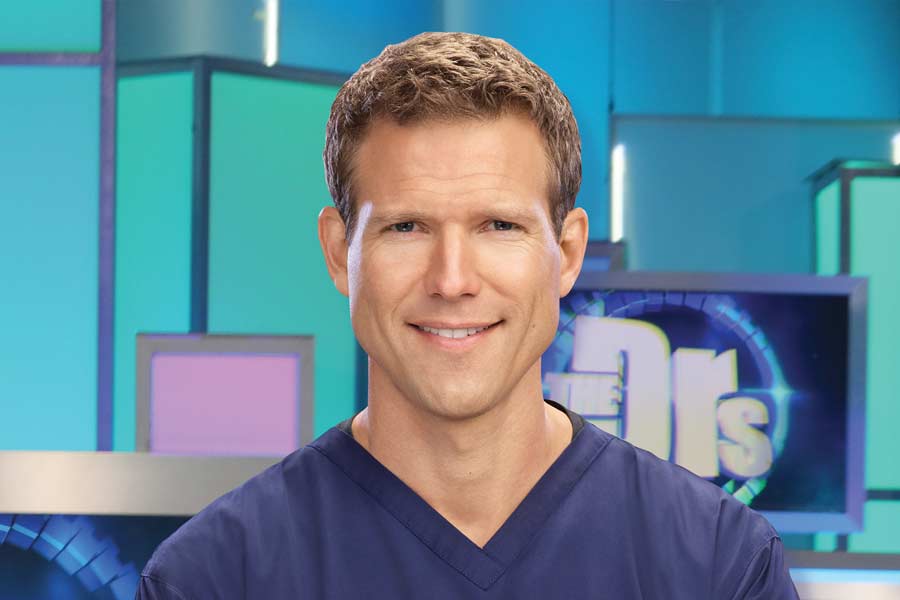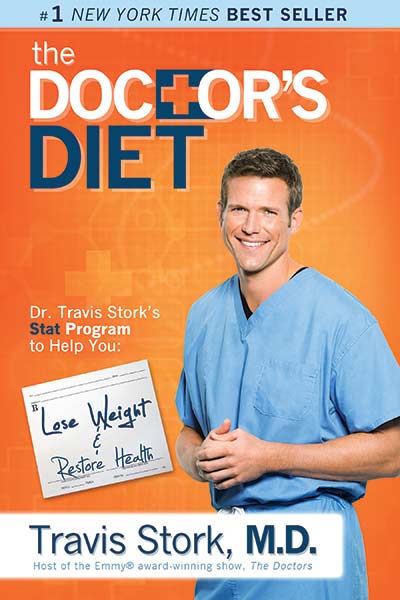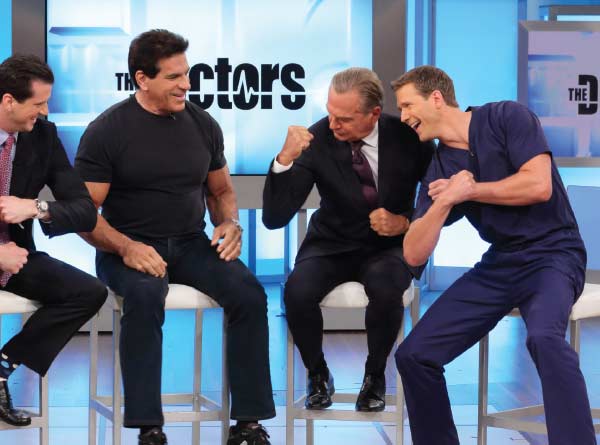Travis Stork, MD
The ER doctor and television host shares tips for a healthy mouth and body
 |
| Photo provided by The Doctors/Stage 29 Productions |
Emergency room doctors really do see it all: Around the clock, they treat people of every description and with every type of urgent medical condition. Doing their job gives them a unique perspective on America’s health. Dr. Travis Stork is a physician who has gone from the emergency room to the living room as host of the syndicated TV show The Doctors. In a wide-ranging interview with Dear Doctor magazine, Dr. Stork shared his tips for healthy living, his passion for teaching, and his experiences as a patient in the dental chair!
What made you decide to go into emergency medicine?
I loved how you always had to be on your game, how at any moment, anything could happen — and it does! And I love having to know a little bit about everything. Emergency medicine is such a unique profession and there’s nothing I will ever do in my life that is as difficult as being a good ER doc.
In your book The Doctor’s Diet, you note that most people end up in the ER not because of trauma or accidents, but because of their diets. Why is that?
 |
| The Doctor’s Diet |
You go into emergency medicine and your expectation is gunshot victims, car accidents, but over time you realize that a lot of what you’re taking care of is not necessarily an accident, it’s a lifetime of bad decisions when it comes to our health. We all know there’s an obesity epidemic going on, so over time I realized more and more of my patients were suffering with chronic illness. I call it the proverbial cliff in medicine where maybe you initially get a diagnosis of diabetes, and maybe you’ve put on weight over the years, and that can lead to kidney disease. Then you have a heart attack, and that’s when you end up in the emergency department. And I’ll come in and patients will say to me, “Doc, I wish I had changed years ago,” because they feel like at that point it’s too late. That’s why I preach so often on the show, let food be your medicine, not your poison.
How can food be healing?
It’s not so much about only eating particular “healthy” foods, or avoiding specific “unhealthy” foods. For example, grains have gotten a bad rap. But a recent study showed that people who ate an extra serving of whole grains reduced their risk of dying from heart disease. So it’s not as simple as “carbs are bad” or “grains are bad,” it’s, hey — let’s balance this all out. And if we’re going to eat grains, we’re going to eat whole grains. We’re going to eat things that are for the most part in their more natural form. And when we eat packaged foods, we’re going to know what’s on the ingredients list, we’re going to learn what it means.
What are a few easy things people can do to reduce their chances of ending up in the ER that way?
I have what I call the S’s: watch your sugar intake; sit less; get enough sleep; manage your stress; and the fifth one, which surprises people, is social — make sure you’re maintaining social connections, make sure that emotionally you’re getting what you need out of life because if you don’t have relationships with your friends and family, what’s the point?
 |
| Photo provided by The Doctors/Stage 29 Productions |
Have you seen any dental emergencies in the ER?
You see a lot of dental emergencies in the ER. You see a lot of dental problems which probably aren’t emergencies as well. A lot of dental problems are best solved in the dentist’s office. We’re trained to do a lot of things in the mouth, but I’m not going to do a root canal!
What is your advice to someone experiencing a toothache — should they go to the ER or their dentist?
If the dentist’s office is open, and you can go see your dentist for a toothache, that’s where you need to be without a doubt. Having said that, if it’s the middle of the night and you have dental pain and your face is starting to swell, then you go to the ER. A dental infection can sometimes lead to a big-time abscess that can become — and I’ve seen this in young men, where it becomes life-threatening in a matter of minutes. It doesn’t mean that if you have what you perceive as a dental emergency that you don’t go to the ER, but for most run-of-the-mill toothaches, there’s not a lot of service you’re going to get in the ER. We don’t fill cavities!
Do you ever recommend to your ER patients that they get regular dental checkups?
As an ER doctor, I’ve become the perfect person to talk about how oral health is connected to overall health, diabetes, heart health, so I talk all the time to people about, look, you’ve got to get an oral care regimen in place and commit to it every single day; teach your kids to do it. You may not realize that by doing that you could be prolonging your life, but you are. Just as much as doing all the other things that I try to encourage folks to do, whether it’s being active, sleeping enough, eating well, so it seems bizarre but as an ER doc, I’m always talking about oral health.
“Nearly 50% of us have periodontal (gum) disease with bone loss, many of us don’t even know it, here in the US.”
How is oral health related to overall health?
The data started coming out when I started hosting The Doctors about gum disease being related to other things like heart disease and diabetes, and of course it raises your eyebrows — how could that be? But more and more, what I believe to be true and what a lot of studies are suggesting is that there is an association between [systemic] inflammation and your gums…. If you think about it, every organ in our body is connected with our bloodstream. It [stands to] reason that let’s just say you have a high bacterial load in your mouth leading to inflammation, and we know how bacteria can seed one part of the body and then seed another part of the body, and then your body’s immune system reacts to that and forms inflammation in all of these various body parts, so inflammation really does become a whole-body phenomenon.
Isn’t inflammation a protective response that our body uses to fight disease? Why then is it harmful?
What is inflammation? Well, in many cases it’s your body’s immune system reacting to fight off, say, an infection. But a lot of times what we’re doing now is creating inflammation in places where there’s no need for it to be. So if you have an inflammatory response and it potentially is fighting off an infection, great. But what’s interesting nowadays is our bodies are in such a pro-inflammatory state because a lot of us eat way too much sugar; interestingly enough, we’re seeing more and more in the way of auto-immune illnesses, where our bodies’ immune systems are attacking our healthy organs; more and more allergies; so inflammation can mean a lot of different things — it’s not always bad, but inflammation where it doesn’t need to be, that is always bad.
How prevalent is gum disease in this country?
People are always surprised when I say that nearly 50% of us have periodontal (gum) disease with bone loss, many of us don’t even know it, here in the US. Nearly two-thirds of diabetics have some form of gum disease. I’ve read that nearly 70% of pregnant women will also develop some form of gum disease. So it’s predominant, it’s out there, and people need to pay attention to it.
How do you maintain your own oral health?
I’m a big believer in brushing twice a day, using a good oral rinse twice a day, and flossing at least once a day.
“Bleeding is just not a good thing when you’re flossing — it’s a sign that things aren’t quite right.”
Is bleeding when you floss or brush cause for concern?
When I talk about bleeding gums, I always ask people: If you started bleeding from your eyeball, would you seek medical attention? And they all say yes. So why is it that when we bleed all the time when we floss that we think it’s no big deal? If you’re bleeding when you floss, that means you may have gum disease, so you need to step it up with your oral care routine. Bleeding is just not a good thing when you’re flossing — it’s a sign that things aren’t quite right.
Do you see a dentist regularly?
I go twice a year for dental cleanings, but for some people — those who are prone to gum disease — they have to go every three months. I did not go to the dentist for two-plus years in medical school and my excuse was I didn’t have any money. [Then] when I went to the dentist, the first thing he did was shake his head because of how much plaque [and tartar] had built up. Now, religiously, I go twice a year.
You have mentioned suffering a dental injury of your own — to your front teeth. What happened?
I was elbowed in my two front teeth when I was playing basketball in my teenage years. My two teeth were sticking straight back. What I did was, in the middle of the game, I pulled them forward, pushed them back up and in, and ignored it. I wanted to stay in the game. A little bit after that, they started turning dark in color, one in particular, the other starts hurting a little bit more. It turned out that I had done significant damage…. If I had gone back and told myself as a teenager what to do, I would have worn a mouthguard, not only to protect my teeth but also to help potentially reduce risk of concussion. I would have saved myself a lot of dental heartache if I had worn a mouthguard!
Your two front teeth were restored with crowns. Are you happy with the results?
We’re very lucky nowadays with cosmetic dentistry, because you can’t tell. Luckily I can smile, I don’t have to stress about it, it looks good.
You underwent a televised root canal procedure. Why did you decide to share this experience so publically?
Everyone’s so afraid of them — “oh, it’s like getting a root canal” — so I did it on TV because I wanted to prove to people it’s not that big of a deal. Root canals have such a bad rap — “oh, it’s as painful as a root canal.” Root canals are so fun — it’s good TV! If you don’t do the root canal, it can lead to more and more problems, and even I didn’t fully realize that. It could be a lot worse if you don’t address it.
How important is it, both as a television personality and as a doctor, to have a great smile?
I think the ability to smile is important, period. Any smile is beautiful. When people smile, it’s a good thing. I take my job seriously, but I try not to take myself too seriously. We joke a lot on the show. I’m happy that I get to smile a lot. And I’m happy that I have a good dentist — a good dentist is key!



